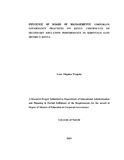| dc.description.abstract | The purpose of this study was to investigate the influence of BOMs corporate
governance practices on Kenya Certificate of Secondary of Education
Performance in Kirinyaga East District in Kenya. The objectives of the study
were; to establish the extent to which round table meetings influence KCSE
performance, to determine the extent to which BOMs target setting influence
KCSE performance, to establish the extent to which provision of incentives by
BOM influence KCSE performance, to establish the extent to which BOMs
resource mobilization influence KCSE performance and to establish the challenges
faced by BOMs corporate governance. The study is organised into five chapters;
introduction, literature review, research methodology, data analysis, presentation
and interpretation, and lastly summary, conclusions and recommendations. The
study used descriptive survey design. Stratified sampling method was used
whereby 171 teachers, 24 principals and 24 BOM chairpersons were used. The
research instrument was the questionnaire which consisted both closed and openended
questions. Content validity was also ensured by the researcher who
discussed the items in the instruments with the supervisors, lecturers and
colleagues from the department. The advice given helped the researcher to
determine the validity of the instruments. Instrument reliability was tested by use
of test-re-test method where a pilot study of 2 schools from the neighbouring
district was used. A correlation coefficient of 0.75, 0.78, and 0.73 for the teachers,
principals, BOMs chairpersons respectively was obtained. The questionnaire
return rate of162 (74.00%) was realised. Descriptive statistics of both quantitative
and qualitative data was collected, sorted, coded and analysed using SPSS version
22.0. The results of analysed data was presented through narrative tables of
frequencies, percentage tables as well as pie-charts. The study sort to analyse the
objectives from the research questions. The findings on BOMs consultative round
table meetings and their influence on KCSE performance indicated that, a majority
(24%) of the respondents indicated that the meetings contributed to a very large
extent, 23.5% large extent. On whether BOMs target setting and follow-up
influenced KCSE performance, the study indicated that a majority (69%) agreed.
The study findings also indicated that BOMs provided incentives which greatly
influenced KCSE performance. A majority (40%) indicated that they influenced to
a very large extent. On BOMs resource mobilization and the extent to which they
influenced KCSE performance, a majority (35%) indicated very large extent, 34%
large extent. This study also indicated that BOMs corporate governance was faced
by a myriad of challenges that need to be addressed. The research findings
concluded that BOMs round table meetings, the setting of academic targets,
provision of incentives, and BOM resource mobilization influence KCSE to a
large extent. Therefore BOMs corporate governance practices influence KCSE
performance. The study findings recommended that, BOMs, the principals and the
teachers to establish more avenues to bring more positive results. | en_US |

